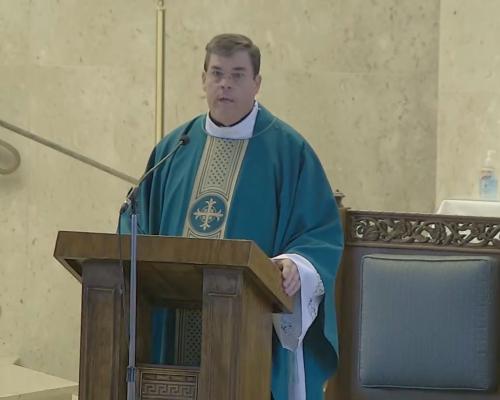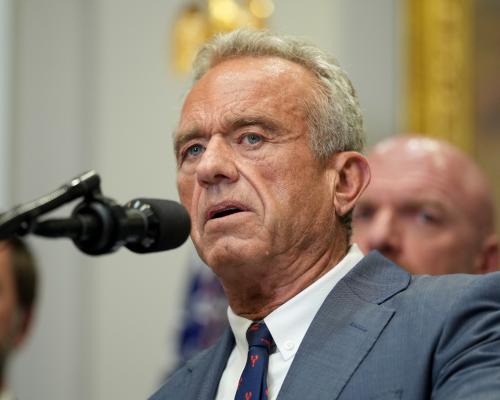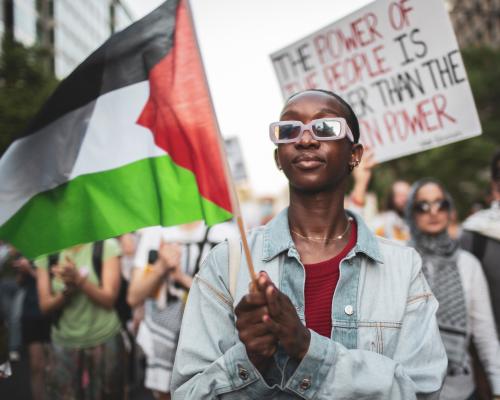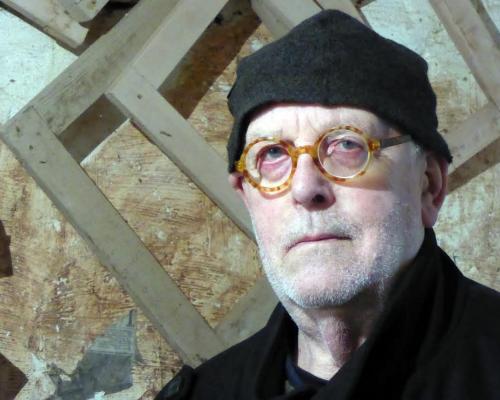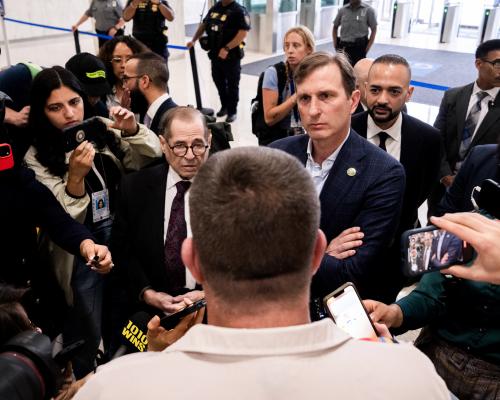
In May, the Arizona representative Yassamin Ansari toured a detention facility where immigrants rounded up as part of the Trump administration’s campaign of mass deportation were being housed. She described what she saw inside as “sickening” and “worse than prison” – immigrant detainees were held in overcrowded, moldy cells and many reported that they did not have reliable access to food, water or medical care.
Two months later, Ansari returned to the remote desert complex to conduct another congressional oversight visit. This time, she was denied entry.
It wasn’t an isolated incident. From New York to California, Democratic members of Congress have been repeatedly blocked from entering Ice detention facilities where thousands of noncitizens – many with no criminal convictions – are being held.
Democratic officials’ legislative checks – a legal right for members of Congress – have consistently confirmed reports that immigrant detainees are being kept in “filthy” and “inhumane” conditions with little regard for due process. Now, the facilities have become a battleground in the intensifying standoff between the Trump administration and Democratic lawmakers over the president’s supercharged immigration agenda.
“The administration’s goal is to intimidate us and bully us, bully us out of doing our jobs for sure,” Representative LaMonica McIver, a New Jersey Democrat who has been accused of assaulting federal agents during a confrontation at the Delaney Hall detention center, told the Guardian. “If they can get away with doing this to me, they can get away with doing it to anyone. But more importantly, imagine what they’re doing in the dark to others who are not of an elected status, who are not in public eye view.”
McIver, who has pleaded not guilty, said her concerns took on new resonance when, a month later, detainees at the hastily-converted jailhouse pushed down a dormitory wall – an act advocates described as an outcry against hunger and overcrowding.
Republicans accuse Democrats of failing to follow protocol, and say their unannounced visits are more political grandstanding than genuine congressional oversight. But Democrats counter that it is their responsibility to shed light on the most hidden aspects of Trump’s deportation agenda, which has ensnared Daca recipients, legal residents and even US citizens.
A report released last week by Democratic senator Jon Ossoff’s office, compiled in part from site visits, found widespread human rights abuses in immigrant detention centers, including the mistreatment of pregnant women and children. “Obstruction of Congressional oversight by the Department of Homeland Security has been an impediment to site visits and interviews with detainees,” the report noted. The DHS sought to debunk the report, calling its allegations “garbage” and saying Ossoff and his staff have never been denied oversight visits.
Last month, a dozen Democratic members of Congress filed suit over a Trump-era DHS policy requiring members of Congress and their staff to provide a week’s notice before any requested visit. They say the requirement is more than red tape – it is unconstitutional. The rule, the lawmakers argue in their suit, unlawfully restricts their oversight authority and prevents a co-equal branch of government from doing its job.
Under a provision of federal law that funds Ice, the government may not prevent a member of Congress “from entering, for the purpose of conducting oversight, any facility operated by or for the Department of Homeland Security used to detain or otherwise house aliens”. Requiring advance notice, Democrats say, gives the administration time to create a misleading picture of daily operations.
“This is kind of like general oversight 101,” Colorado representative Jason Crow, a Democrat and one of the plaintiffs, told the Guardian. “You announce a visit, and they roll out what they want you to see, and things are dressed up and cleaned up.”
Crow has conducted site inspections at immigration detention sites in his district since 2019 – and he helped pass the law that solidified Congress’s right to make unannounced inspections. In July, he was blocked from entering a center in Aurora.
Similar confrontations are playing out nationwide. On Wednesday, a delegation of Democratic representatives from New York, including the chair of the Congressional Hispanic Caucus, Adriano Espaillat, were turned away from a center in Brooklyn now housing detained immigrants under a new agreement with the Bureau of Prisons.
“This blatant lack of respect towards the legislative branch is a deterioration of checks and balances,” Espaillat said after the encounter. “All while they hide their atrocities from the public.”
In a response posted on X, the DHS called the lawmakers’ efforts “deeply unserious”. “These members did not follow proper protocol and schedule their visit. Instead they brought a gaggle of media to drive clicks and fundraising emails,” the department said.
In a statement, department spokeswoman Tricia McLaughlin said Ice had imposed the new visitation policy to protect the president’s constitutional authority to carry out immigration enforcement and protect agency personnel from “a surge in assaults, disruptions, and obstructions to enforcement — including by member of Congress themselves”.
“A week is sufficient to ensure no intrusion on the President’s constitutional authority,” she said.
As relatives and lawyers struggle to locate and contact people in Ice custody, advocates say congressional visits are essential to building a public record of conditions inside facilities that operate far from public view.
“We are not talking about a mistake here and there,” said Clarissa Martínez De Castro, vice-president of the Latino Vote Initiative at UnidosUS. “We’re talking about a pattern of abuse that is happening in multiple communities, and bearing witness to that, and building that record so that members who may want to … are not able to say that this is happenstance or anecdotal.”
Ice arrests and detentions rose sharply in the first six months after Trump returned to the White House. In Democratic-leaning states masked Ice agents are frequently arresting immigrants at worksites, in the streets and in mass roundups – aggressive tactics that triggered protests in cities such as Los Angeles. Their targets are increasingly people with no criminal records at all.
As arrests soar to record numbers, the nation’s immigration detention system – a patchwork of government-run and private facilities – is buckling under the strain. By late June, it was over capacity by more than 13,500 people, according to a Guardian analysis of public data from the Deportation Data Project. Ten immigration detainees have died in federal custody so far this year, compared to 11 deaths in all of 2024.
McLaughlin called claims of overcrowding and poor conditions at Ice detention centers “categorically false”. The agency, she added, has “worked diligently to obtain greater necessary detention space” to accommodate the Trump administration’s mass arrest and incarceration operation.
The scramble to create more detention beds has seen the agency sign new contracts with private prisons companies, as well as federal and state prisons. The secretary of the DHS, Kristi Noem, recently touted plans to open a detention center in Indiana it calls the “Speedway Slammer”, following the opening of “Alligator Alcatraz”, a facility built in the middle of the Florida Everglades. Last week, the Pentagon said Fort Bliss, an army base in Texas, was prepared to accept as many as 1,000 immigrant detainees by the end of the month.
On Tuesday, the Trump administration was ordered to improve conditions inside an immigration holding facility in New York City, after advocates filed a lawsuit on behalf of detainees who described being kept in unsanitary and overcrowded cells, without access to basic necessities, including hygiene products.
***
Shortly after immigration raids swept Los Angeles in June, triggering days of tense protests, Congresswoman Judy Chu of California said her office began receiving urgent requests from advocates and worried family members asking for help locating people believed to be held at a center in the remote desert town of Adelanto.
Chu had visited the facility several times during her years in office. But on 8 June, guards scrambled to lock the fence when she arrived with California congressmen Gil Cisneros and Derek Tran, she recounted. The trio shouted their names and held up signs identifying themselves as members of Congress – but they were turned away.
“It was illegal, of course, because we have this right to go in,” Chu said in an interview.
More than a week later, Chu and a larger delegation of California Democrats were granted access to the facility and were able to meet with people detained during the raids, including a Daca recipient. Some said they had gone days without a change of clothes and were, in many cases, unable to call their families or legal representatives.
“We must keep on trying, because otherwise we don’t know what will happen to these detainees,” Chu said, vowing to push for more access. “The less attention that is being given through our oversight inspections, the more [DHS] thinks it can get away with the worst conditions possible.”
Congressman Jay Obernolte, a Republican of California, came away with a different impression when he toured the Adelanto facility in July, days after Trump deployed the national guard and active duty marines to quell the immigration protests that had erupted across Los Angeles. In a statement, he said that those in custody at the facility have “access to medical care, legal counsel, meals, and the full rights guaranteed under federal law”.
“Facilities like Adelanto exist to help Ice enforce our immigration laws and keep our communities safe,” he said. “The vast majority of detainees housed here have committed serious crimes in addition to being present in our country illegally. They are being processed quickly, fairly, and humanely.”
In a statement, a spokesman for the private prison firm GEO Group said that the detention facilities it operates, like Adelanto in California and elsewhere across the country, provide “around-the-clock access to medical care” as well as “in-person and virtual legal and family visitation” in addition to other services. The detention centers adhered to strict federal detention standards on safety, food and medical care in addition to the facility’s capacity, the spokesman said, stating: “Simply put, our facilities are never overcrowded.”
As Democratic officials continue to face barriers, they have started sharing best practices for securing access.
Before visiting a facility in Eloy, Arizona, to check on a local restaurant owner held there in Ice custody, Congressman Greg Stanton consulted another member of Congress for advice. He brought a copy of the law that affirms members’ oversight rights and asked to speak with senior officials on site.
Still, he was refused entry.
“I think others feel the same way I do, which is, you don’t get to pick and choose which laws you follow,” Stanton said. “And it may be inconvenient to have a member of Congress show up and try to do their duty of oversight, but that doesn’t matter. This is what the law says, and you’ve got to follow the law.”
Brian Todd, a spokesman for the private prison contractor CoreCivic, which operates the Eloy Detention Center, said that while the company endeavors to be “as accommodating and transparent as possible,” all congressional visits must be coordinated through Ice’s office of congressional relations. He also said that the facilities were closely monitored by federal observers to ensure compliance and said claims of poor food or water quality at the center were “patently false”.
“We know this is a highly charged, emotional issue for many people,” Todd said, “but the fact is we operate safe, secure facilities that provide high quality services for our government partners at Ice”.
Crow, the Colorado congressman, began inspections of a privately operated immigration facility outside Denver in 2019, following repeated community reports about poor conditions, disease outbreaks, access to medical care and poor food storage.
“I represent a lot of immigrants and refugees, and frequently we’re dealing with their families or with constituents and checking on individual conditions or access to counsel for residents of our district,” he said.
At first, access was limited – prompting his push to strengthen protections for members of Congress. He eventually created a toolkit complete with a template for oversight visits, which he now shares with other members of Congress.
“There are egregious abuses occurring on a daily basis around the country, everything from unmarked vans with masked agents jumping out and grabbing people … to the lack of access to legal counsel and a variety of abuses,” he said. “So that’s what we’re worried about. And clearly this administration wants to hide their activities.”
McIver, whose charges stem from an attempt to shield Newark mayor Ras Baraka from arrest during a protest at the facility, said she still has a right to conduct oversight visits – she remains a member of Congress and serves on a homeland security committee. But with a serious legal case pending, she has opted not to return – for now.
“They’re using me as an example to try to be as cruel as possible to me and humiliate me and intimidate me, hoping that that will carry over to other people,” she said.
Despite the risks, other Democratic members of Congress are still showing up – even when doors are slammed in their faces – because, as McIver put it, “it’s their job”.
“They’re not stopping.”

